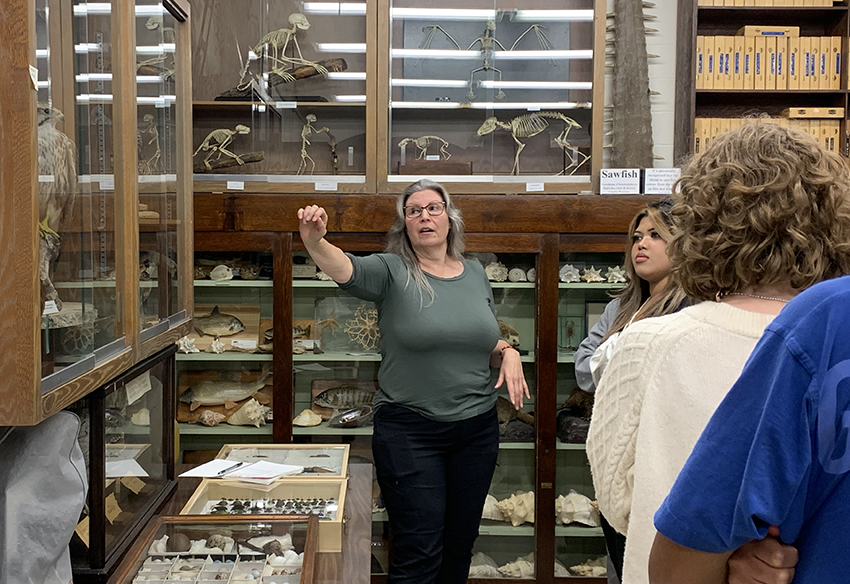Second Year
Second Year Courses:

Dr. Nina Zitani leads second-year SASAH students through the Department of Biology's Zoological Collections
SASAH 2230F - Digital Tools, Digital Literacies
What are the implications of “the digital turn,” and what does it mean to pursue “literacy” in an era of seemingly endless information? This course examines the development of information systems and technologies by considering their past, present, and potential future trajectories. We also explore how we shape (and are shaped by) these technologies with hands-on activities and collaborative research projects. Course materials survey how digital researchers and historians, web and software developers, artists, authors, activists, and theorists inform and engage our digital landscapes—posing critical questions of social, political, economic, and creative significance. We discuss the discipline of the Digital Humanities and evaluate the impacts and effectiveness of a variety of digital tools on our research: understanding an applying large language models (LLMs); engaging critically with social media and content platforms through introductory design skills and creation (coding, HTML, CSS, metadata); bibliography and citation tools; navigating search engines, databases, and a range fo digital archives; using text mining and analytics software to explore and express large amounts of data.
Prerequisite: 75% or higher in SASAH 1020E or the former ArtHum 1020E. 3 hours/week, 1.5 course
SASAH 2240G – Foundations of Theory in the Arts and Humanities
This survey of literary theory and criticism introduces students to some of the most important genealogies of cultural, aesthetic, and political thought since antiquity. By developing tools to analyze the ineffable “products” of culture—such as race, desire, power, fantasy, and ideology—theory helps us navigate our cultural landscape. To that end, we will explore psychoanalysis, structuralism, postcolonial criticism, black studies, queer theory, and other theoretical movements that have transformed how we interpret the world. Throughout the course, we will remain mindful of how urgent questions of race, gender, class, and geopolitics are not to be treated separately from theory and criticism, but are instead embedded in aesthetic, cultural, and social thought from the outset. In other words, rather than treating movements like feminism or postcolonial criticism as though they exist in a vacuum, we will consider how race, gender, class, etc. have always informed theory.
Prerequisite: 75% or higher in SASAH 1020E or the former ArtHum 1020E. 3 hours/week, 1.5 course
SASAH 2290F - Research Topics in the Arts and Humanities
Many of the social justice movements of the late 20th and early 21st centuries are familiar to us through photographs. The civil rights movement, campaigns for women’s rights, Indigenous rights, and rights for the LGBTQ2S+ community, as well as disability rights and the movement for Black Lives, have all been negotiated photographically. Alongside public protests, visual artists and activists have created photographic work that has contributed to these struggles for equality. Focusing on social justice movements from the late 20th century to the present, this course explores different practices of photography, from portraiture and photojournalism to contemporary art to consider how photography structures ideologies and encounters but also how it can unsettle and dismantle systems of oppression. Throughout the course, students will develop their own research on a social justice issue of their choice in the form of a research essay and a photographic project.
Prerequisite: 75% or higher in SASAH 1020E or the former ArtHum 1020E. 3 hours/week, 1.5 course
SASAH 2291G - Research Topics in the Arts and Humanities
Advocacy is defined as generating support for a particular cause in the public sphere, and it is an important space where political purpose and civic engagement meet to foster change. Advocacy movements take myriad forms, and actions may be directed toward advocating for the self, advocating for others, or advocating for total systems change at the local, national, and cultural levels. Advocacy encompasses movements for climate justice, food security, political participation, labour rights, human rights, cultural awareness, legal justice, medical access, and so much more. As a citizen, what is your current relationship with advocacy? Have you ever felt compelled (or even forced) to advocate for yourself, for a friend or family member, or for a group?
In this course, we will focus locally to explore histories of advocacy within London and the surrounding region while gaining experience with archival research practices. Your own personal advocacy concerns will guide your explorations of a local archive of advocacy. You will be challenged to bridge the past and the present by bringing your case study research into contact with current advocacy movements. We will meet with advocacy leaders who work on the ground and with various civic and community partners. Throughout the course, we'll be developing a language for advocacy: thinking through the kind of advocacy we can do in our own lives, examining important critiques of advocacy movements, and engaging challenges for advocating critically and effectively in the digital present.
Prerequisite: 75% or higher in SASAH 1020E or the former ArtHum 1020E. 3 hours/week, 1.5 course





